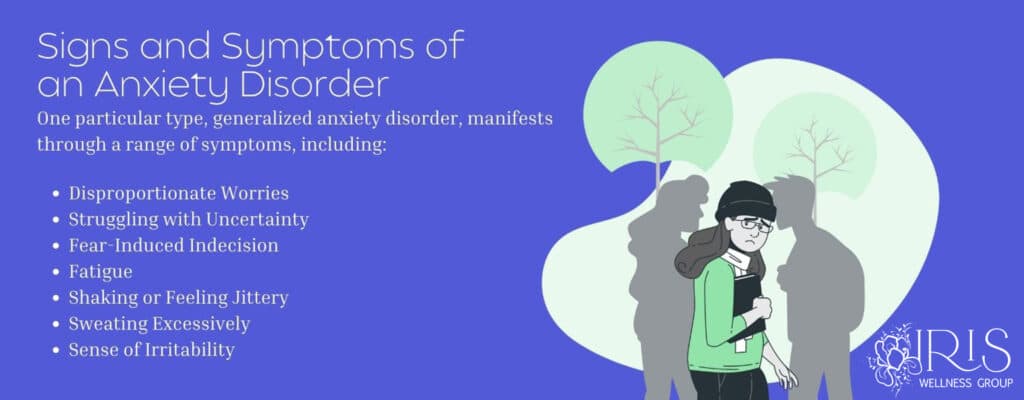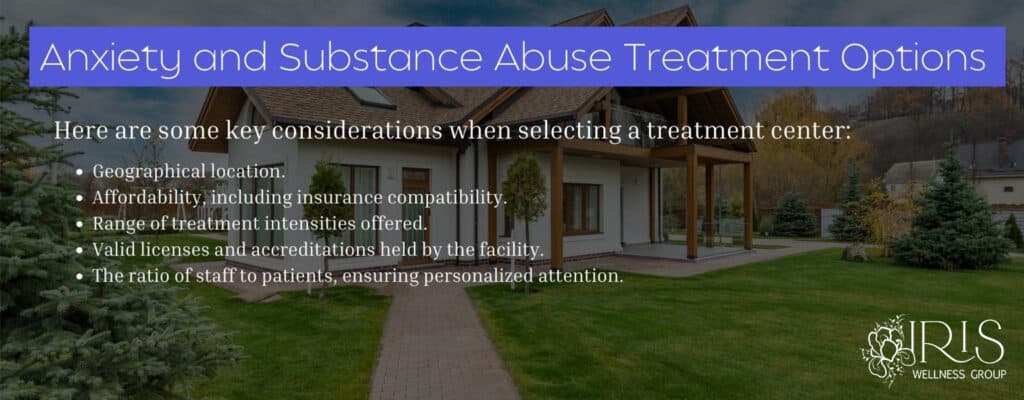Table of Contents
What is an Anxiety Disorder?
Anxiety disorders are a category of mental health conditions marked by excessive fear, dread, and physical symptoms such as a racing heart and sweating. While it’s natural to experience anxiety occasionally, like before a job interview or making significant decisions, this emotion can be beneficial. It alerts us to potential dangers and sharpens our focus, ensuring our safety.
However, anxiety disorders transcend occasional nervousness. They arise when:
- Anxiety disrupts daily functioning.
- Emotional triggers result in disproportionate reactions.
- Responses to situations become uncontrollable.
Such disorders can be debilitating, making daily tasks a challenge. They’re not uncommon, either. As per the National Institute of Mental Health (NIMH), roughly 31.1% of U.S. adults will grapple with an anxiety disorder at some juncture in their lives. The NIMH lists various types of anxiety disorders, including:
- Panic Disorder
- Generalized Anxiety Disorder (the predominant type)
- Agoraphobia (an anxiety-driven fear of specific spaces or circumstances)
- Specific Phobias
- Social Anxiety
- Post-Traumatic Stress Disorder (PTSD)
- Obsessive-Compulsive Disorder (OCD)
- Separation Anxiety Disorder
For those wrestling with anxiety disorders, Iris Wellness Group provides anxiety disorder treatment in Tennessee. As a premier anxiety treatment center, our specialized clinical team is ready to craft a treatment regimen uniquely suited to your requirements. We advocate for individualized strategies, blending a spectrum of anxiety treatment methods, to ensure the most promising route to recovery. Although therapeutic methods may vary depending on the type of anxiety and the individual, there’s a consistent thread that ties these disorders together in their shared characteristics.
Who is at Risk for Anxiety Disorders?
A combination of genetic and external factors can increase an individual’s likelihood of developing anxiety disorders. Your risk might be elevated if you:
- Possess certain personality characteristics, such as shyness or behavioral inhibition, which manifests as discomfort or avoidance of unfamiliar people and situations.
- Have experienced stressful or traumatic events either in early life or as an adult.
- Have a family lineage of anxiety or other mental health disorders.
- Suffer from certain medical conditions, like thyroid issues or heart arrhythmias (irregular heartbeats).
It’s observed that anxiety disorders are more prevalent in women. The reasons behind this trend are still under research. Some hypotheses suggest it might be related to hormonal variations in women, particularly those that change throughout menstrual cycles. The hormone testosterone, which is more abundant in men, might also have a role in reducing anxiety. Another perspective is that women might be less proactive in seeking treatment, leading to a progression in the severity of the anxiety.

Signs and Symptoms of Anxiety Disorders
Anxiety disorders, like other mental health conditions, aren’t a result of personal weaknesses, character flaws, or upbringing deficiencies. The exact cause of anxiety disorders remains elusive to researchers, but it’s believed to be due to a mix of factors. One particular type, generalized anxiety disorder, manifests through a range of symptoms, including:
- Excessive, disproportionate worries about various topics.
- Overanalyzing and fearing the worst possible outcomes.
- Viewing non-threatening situations as menacing.
- Struggling with uncertainty.
- Fear-induced indecision.
- An inability to dismiss or move on from concerns.
- A perpetual feeling of restlessness or being on edge.
- Challenges in focusing, accompanied by feelings of a blank mind.
Physical symptoms can encompass:
- Fatigue.
- Sleep disturbances.
- Muscle tension or discomfort.
- Shaking or feeling jittery.
- Proneness to nervousness and being easily startled.
- Sweating excessively.
- Gastrointestinal issues, like nausea or irritable bowel syndrome.
- A general sense of irritability.
Occasionally, one might feel anxious without a clear cause, consumed by concerns about personal safety or a looming sense of impending doom. These feelings of anxiety can significantly disrupt daily life, affecting work, social interactions, and other areas. The subjects of worry can be fluid, shifting from one to another and evolving with age.
For children and teenagers, the manifestation of anxiety can slightly differ. They might worry excessively about:
- School or sports performance.
- The safety of family members.
- Punctuality.
- Major catastrophic events like earthquakes or nuclear warfare.
Adolescents with heightened anxiety might:
- Struggle with fitting in.
- Exhibit perfectionistic tendencies, even redoing tasks multiple times.
- Dedicate excessive time to homework.
- Show a lack of self-assurance.
- Continuously seek approval and reassurance.
- Frequently complain of physical ailments like stomachaches.
- Avoid school or social gatherings.
If you, a family member, or a loved one—be it an adult or adolescent—are confronting these anxiety symptoms, prompt action is crucial. Iris Wellness Group, a renowned anxiety treatment center, offers tailored treatment solutions for adults and features an Adolescent Intensive Outpatient Program (IOP) and dual-diagnosis treatments. Our programs are meticulously designed to tackle anxiety and any accompanying disorders. Don’t let anxiety disorders eclipse the potential for a fulfilling life. Contact us today at 423-460-9766 and explore how our all-encompassing adult and adolescent anxiety disorder treatment programs can lead you or your loved ones towards healing and mental harmony.
Anxiety and Substance Abuse
Substance misuse is notably higher among individuals with anxiety disorders than in the broader population. Notably, those with anxiety disorders tend to have elevated rates of alcohol misuse and increased chances of relapse post-alcohol rehab, as highlighted by Psychiatric Times. Moreover, the withdrawal symptoms can be more intense for these individuals when ceasing drug or alcohol use.
When an individual has both a substance use disorder and an anxiety disorder (or another mental illness), it is termed a “dual diagnosis” or “co-occurring disorders.” Several factors can explain the interplay between anxiety and substance misuse:
- Self-regulation of Symptoms: A prevalent theory suggests that those with anxiety disorders might resort to drugs or alcohol to manage their symptoms. For example, someone with social anxiety might drink alcohol to navigate stressful work situations, which could escalate to dependence and addiction.
- Biochemical Correlations: Both anxiety and substance misuse can be linked to chemical imbalances in the brain. For instance, decreased serotonin levels, a neurotransmitter tied to various physiological functions, have associations with both alcoholism and mental health disorders.
- Genetic Factors: Some research indicates that there’s a genetic link between addiction and anxiety disorders. Individuals predisposed to anxiety might also be more susceptible to substance misuse, particularly if they have a family history of both conditions.
- Effects of Substance Misuse or Withdrawal: Consuming drugs or alcohol can induce anxiety-like symptoms, such as agitation and sleeplessness. During withdrawal, one might experience heightened anxiety as the brain readjusts its chemical equilibrium.
Frequently, those with anxiety use drugs or alcohol as a coping mechanism. However, this approach is precarious since it offers only a temporary reprieve. As substances wear off, the anxiety resurfaces, often intensified.
Over time, the brain becomes acclimated to the presence of these substances. This adaptation means that over time, achieving a relaxed state without drugs or alcohol becomes nearly impossible. This cycle can lead to increased consumption to alleviate anxiety symptoms, establishing a dangerous loop.
Recent research on the nexus between anxiety and addiction found:
- Between 10 to 40% of alcohol addicts also suffer from panic-related anxiety disorders.
- 10 to 20% of individuals with anxiety disorders misuse drugs or alcohol.
- For the majority of study participants with both disorders, anxiety predated their substance abuse.
Recognizing the coexistence of an anxiety disorder and substance use disorder, or a dual diagnosis, is crucial. Addressing both facets in treatment is essential to achieve long-term recovery and diminish the risk of relapse.
If you or a loved one is navigating the complexities of a dual diagnosis, timely intervention is paramount. At Iris Wellness Group, we specialize in anxiety treatment and offer a comprehensive anxiety rehab program in Chattanooga, TN. Don’t let anxiety and substance misuse control your life. Reach out to Iris Wellness Group today and embark on a transformative journey towards health, balance, and lasting recovery.
Am I having Anxiety or a Panic Attack?
Panic attacks are sudden, intense surges of fear or discomfort that peak within minutes, often accompanied by physical symptoms like rapid heartbeat and shortness of breath. Anxiety, on the other hand, is a persistent feeling of worry or fear about everyday situations, sometimes escalating in response to specific triggers but generally more prolonged and less intense than panic attacks. While both can be distressing, panic attacks are characterized by their abrupt onset and heightened physical responses, whereas anxiety is more chronic and often pervasive in nature. Learn more about the difference between anxiety and panic attacks.
Find Relief at Chattanooga's Top Anxiety Treatment Center.
Generalized Anxiety Treatment Options
Treatment decisions for generalized anxiety disorder hinge on the severity of its impact on daily functionality. The two primary treatments are psychotherapy and medications, often used in conjunction to optimize results. Finding the ideal treatment can require some experimentation to understand what works best for an individual.
Psychotherapy
Commonly referred to as talk therapy or psychological counseling, psychotherapy entails collaborating with a therapist to mitigate anxiety symptoms. Among various therapies, Cognitive Behavioral Therapy (CBT) has proven to be the most effective for generalized anxiety disorder.
CBT therapy for anxiety disorders is typically a short-term approach. It imparts specific skills to deal with worries, helping individuals engage in activities they previously evaded due to anxiety. Over time, as one employs these skills, symptoms naturally lessen and confidence grows.
Medications
There are several medications available for treating generalized anxiety disorder, and discussing their potential benefits, risks, and side effects with a doctor is essential.
- Antidepressants. SSRIs (Selective Serotonin Reuptake Inhibitors) and SNRIs (Serotonin and Norepinephrine Reuptake Inhibitors) are the foremost medicinal treatments. Some commonly prescribed drugs include escitalopram (Lexapro), duloxetine (Cymbalta), venlafaxine (Effexor XR), and paroxetine (Paxil, Pexeva). There are other antidepressants that might also be recommended by doctors.
- Buspirone. This is an anti-anxiety drug used consistently. It usually necessitates several weeks to manifest its full effects.
- Benzodiazepines. Reserved for specific scenarios, benzodiazepines may be prescribed for swift relief from acute anxiety symptoms. As they are generally short-term solutions and can be habit-forming, they are not recommended for individuals with a history of alcohol or drug abuse.
Anxiety Disorder Treatment and Substance Abuse Options
For individuals grappling with both anxiety and substance abuse it’s crucial to address both disorders simultaneously. Integrative treatments that combine therapies and medications tailored for both conditions can provide a more holistic approach to recovery. Such comprehensive treatment ensures that one condition does not exacerbate the other, facilitating a smoother path to healing and stability. It’s essential to choose a treatment center experienced in dual-diagnosis to ensure that all aspects of an individual’s health are addressed.
Iris Wellness Group serves as a beacon of hope as a specialized anxiety treatment center in Chattanooga, Tennessee. With experienced professionals and tailored approaches, they have been pivotal in providing care and support to those battling anxiety and related disorders. Call us today to start your anxiety disorder treatment.

Finding the Right Treatment Center for Anxiety and Substance Abuse
Having multiple mental health conditions can complicate the diagnosis and treatment process. Thus, it becomes paramount to select a rehab facility tailored to your unique needs, ensuring the most effective path to recovery.
Here are some key considerations when selecting a treatment center:
- Geographical location.
- Affordability, including insurance compatibility.
- Range of treatment intensities offered.
- Valid licenses and accreditations held by the facility.
- The ratio of staff to patients, ensuring personalized attention.
At our outpatient anxiety rehab center in Chattanooga, Tennessee, we hold expertise in addressing co-occurring disorders, delivering a comprehensive spectrum of care.
Paying for Anxiety Treatment and Substance Abuse
At the Iris Wellness Group located in Tennessee, we cater to a range of payment options, accepting several leading insurance plans. Additionally, we present financing solutions and alternative payment methods for rehab services.
For detailed information about utilizing your insurance for addiction treatment, reach out to us at 423-460-9766. Our dedicated admissions team is on hand around the clock to address your inquiries and initiate the enrollment procedure.
Alternatively, you can swiftly and confidentially confirm if we accommodate your insurance and validate your benefits through our online form.
Anxiety Treatment Frequently Asked Questions
What Is Anxiety?
Anxiety is a normal and often healthy emotion characterized by feelings of tension, worried thoughts, and physical changes like increased blood pressure. However, when anxiety feelings become excessive, persistent, and interfere with daily life, it may indicate an anxiety disorder.
How to Deal with Anxiety?
Dealing with anxiety involves practicing relaxation techniques, staying physically active, maintaining a healthy diet, getting enough sleep, and avoiding alcohol and caffeine. It’s also important to seek professional help if anxiety becomes overwhelming.
What Does Anxiety Feel Like?
Anxiety can feel like excessive worry, restlessness, a racing heart, rapid breathing, sweating, trembling, feeling weak or tired, trouble concentrating, and having trouble sleeping. The experience of anxiety varies widely among individuals.
Do I Have Anxiety?
If you frequently feel excessively worried, nervous, or afraid to the point it interferes with your daily life, you might have anxiety. It’s important to consult a healthcare provider for a proper diagnosis.
What Is the Treatment for Anxiety?
Treatment for anxiety typically includes psychotherapy, medication, or a combination of both. Cognitive-behavioral therapy (CBT) is particularly effective. Lifestyle changes and self-care strategies also play a crucial role in managing anxiety.
Does Therapy Help with Anxiety?
Yes, therapy can be very helpful in treating anxiety. It provides a safe space to explore the root causes of anxiety, develop coping strategies, and learn how to manage symptoms effectively.
How Does Therapy Help Anxiety?
herapy helps anxiety by teaching individuals how to recognize and change negative thought patterns, confront fears instead of avoiding them, and develop better coping mechanisms and problem-solving skills.
What Is the Best Treatment for Anxiety?
The best treatment for anxiety varies depending on the individual. Often, a combination of psychotherapy (like CBT), medication, and lifestyle changes offers the most effective approach.
Who is Chattanooga Anxiety Treatment Designed For?
Chattanooga Anxiety treatment caters to individuals living in Chattanooga, Red Bank, Signal Mountain, Lookout Mountain, Southeastern Tennessee, Northern Georgia, or surrounding areas. These services are ideal for those who do not require medically supervised detoxification, have a stable and supportive home and work environment, and are self-motivated in their journey towards recovery.
How Long Does Therapy Take for Anxiety?
The duration of therapy for anxiety varies. Some people may see improvements within a few weeks, while others might need longer-term treatment. The length depends on the severity of the anxiety and the individual’s response to therapy.
Can Anxiety Come Back After Treatment?
Yes, anxiety can return after treatment. It’s important to continue practicing the coping strategies learned in therapy and maintain a healthy lifestyle. Ongoing or ‘maintenance’ therapy sessions can also help.
Does Insurance Cover Therapy for Anxiety?
Many insurance plans cover therapy for anxiety, but coverage can vary. It’s important to check with your insurance provider about the extent of coverage, any copays or deductibles, and whether your therapist is in-network.
What Is Outpatient Anxiety Treatment?
Outpatient anxiety treatment involves attending scheduled therapy sessions while continuing to live at home and maintain daily responsibilities. This type of treatment typically includes individual counseling, group therapy, and possibly medication management. It’s designed for individuals who need professional support but do not require intensive, round-the-clock care. To find outpatient anxiety treatment near you, you can search online directories, ask for referrals from your primary care physician, or check with local mental health clinics. Searching “outpatient anxiety treatment near me” online can also provide a list of nearby options, allowing you to choose a program that best fits your needs and lifestyle.









